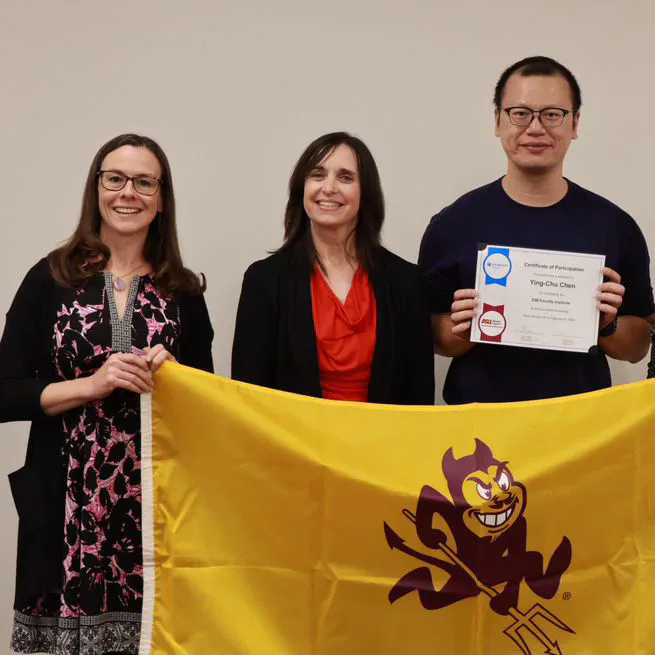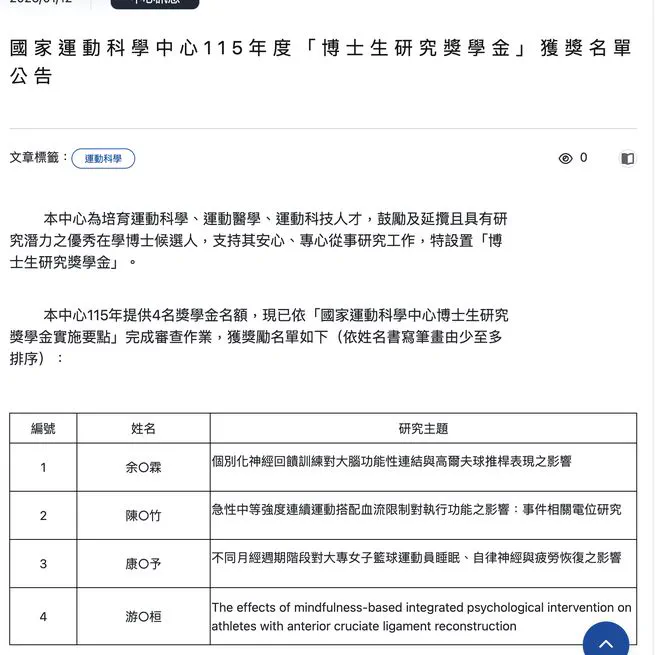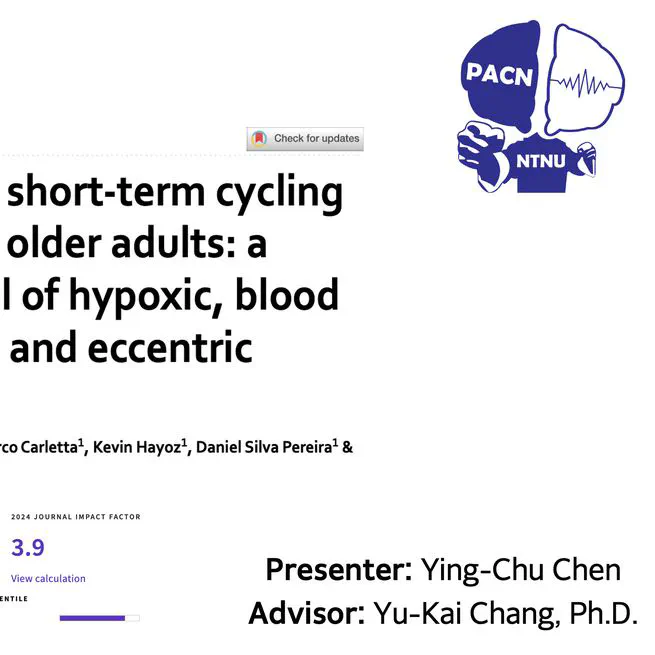
From January 25 to February 7, 2026, Steve Ying-Chu Chen participated in the Fulbright Taiwan EMI Overseas Professional Training Workshop. Held at Arizona State University (ASU), this program provided an intensive look at English as a Medium of Instruction (EMI) through the lens of translanguaging and educational equity. Steve explored how to effectively bridge complex scientific domains—such as exercise science and cognitive neuroscience—with bilingual instruction, fostering a classroom environment that is both academically rigorous and globally connected.
Jan 25, 2026

恭喜陳映竹榮獲國家運動科學中心(TISS)115年度「博士生研究獎學金」!此獎項旨在培育運動科學與科技頂尖人才,全台僅選出四位優秀博士生。映竹以「急性中等強度連續運動搭配血流限制」之研究計畫脫穎而出。Congratulations to Ying-Chu Chen for receiving the 2026 Taiwan Institute of Sports Science (TISS) Doctoral Research Scholarship! This prestigious award, granted to only four students nationwide, supports outstanding PhD candidates specializing in sports science and technology.
Jan 16, 2026

恭喜陳映竹入圍2026年第六屆好好聽FM播客大賽!入圍節目《運動讓腦袋變年輕?》將尖端運動科學轉化為動人聲音,實踐「在歡樂的地方知識流動」。(Congratulations to Ying-Chu Chen for being a finalist in the 6th Hao Hao Ting FM Podcast Competition! His program transforms cutting-edge exercise science into captivating audio, fulfilling the mission of 'Letting knowledge flow in joyful places.')
Jan 15, 2026

Cybernetics English Reading Clubs
Oct 30, 2025

In this journal meeting, Ph.D. Candidate Ying-Chu Chen presented and discussed the paper "Effectiveness of short-term cycling interventions in older adults:a randomized trial of hypoxic, blood flow restriction, and eccentric cycling" by Citherlet et al.
Oct 23, 2025

This randomized controlled trial investigated the acute effects of resistance exercise (RE) intensity and repetition—under matched volume—on inhibitory control (IC). Seventy-eight young adults were assigned to moderate-intensity (60% 1RM, 3×10), low-intensity (30% 1RM, 3×20), or control (reading). Stroop Task performance revealed significantly better IC in both exercise groups (MI: p = .026; LI: p = .040) vs. control, with no difference between MI and LI. Blood lactate increased significantly post-exercise in both RE groups. Results indicate that RE enhances IC regardless of intensity when volume is controlled.
Mar 13, 2025

Multi-component exercise (MCE) is a type of workout that combines different types of exercises and has been shown to improve both physical fitness and overall well-being. A recent study aimed to see how MCE affects physical fitness and quality of life (QOL) in middle-aged adults. The study involved 180 participants, who were split into two groups, one group followed a 24-week MCE program, while the other group did not change their usual routine. Researchers measured their quality of life using a widely recognized tool, the WHOQOL-BREF, and also tested their physical fitness, focusing on muscular endurance. While there were no major improvements in overall quality of life for those in the exercise group compared to the control group, the study found that those who did MCE showed significant improvements in strength. In particular, their upper body strength (measured by seated biceps curls) and lower body strength (measured by sit-and-stand tests) saw a noticeable boost. In conclusion, although the MCE program didn’t make a big difference in the participants’ overall quality of life, it did help them build better muscle endurance, which is an important part of staying active and healthy as we aged.
Oct 17, 2024

University of Queensland, Australia The recent lecture delivered by Professor John Cairney, Head of School, Human Movement & Nutrition Sciences at the University of Queensland, offered a comprehensive look at the evolving field of human movement and nutrition sciences. With Professor Yu-Kai Chang as an inviter, the session brought together prominent minds in the field, providing a platform for meaningful discourse on the interdisciplinary nature of human movement, public health, and innovation.
Oct 4, 2024

In this invited talk, Ying-Chu Chen shared the experience of being a physcial activity and exercise specialist. He also made clear the definite definition of those three terms, i.e., physical activity, exercise, and sports.
Nov 10, 2023

Professor Joan Duda is recognized globally for her knowledge in motivating individuals in physical activities and understanding the factors influencing commitment and optimal performance. Her expertise extends to the psychological and emotional aspects of sports, exercise, and dance. She has a track record of creating, executing, and assessing theory-driven strategies for various groups, from healthy to clinical populations, spanning different ages. Her work stands out for merging significant theoretical models, advancements in methodology, and utilizing both quantitative and qualitative approaches, ranging from field to laboratory studies. Joan spearheads the Motivating Healthy Lifestyle division at the Centre for Obesity Research and is affiliated with the Center on Healthy Ageing and the Institute of Sport, Exercise, and Movement.
Nov 9, 2023